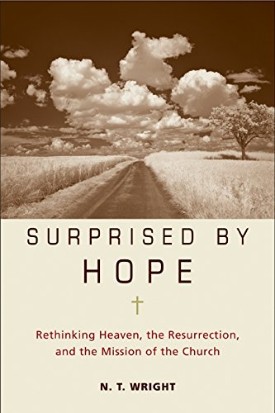Heaven: Better Than You Can Imagine
By Neil Earle

“Eye has not seen, nor ear heard, nor have entered into the heart of man the things which God has prepared for those who love him” (2 Corinthians 2:9).
Most Christians look forward to heaven or some form of eternal reward following this human existence. And rightly so. Even in the Old Testament there was a strong hint at a future much-prized destiny for those who seek and cherish God (Psalm 16:10). In the middle of the Covid-19 outbreak in July, 2020, I was asked by a younger protégé, “What has Jesus Christ put into your mind these days?”
For me, being now 73 years old and being a person with pre-existing conditions it was Hebrews 12:22-24. “But you have come to Mount Zion and to the city of the living God, the heavenly Jerusalem, and to innumerable angels in festal gathering, and to the assembly of the firstborn who are enrolled in heaven, and to God the judge of all, and to the spirits of the righteous made perfect, and to Jesus…”
These verses make up a famous passage near the end of Paul’s Letter to the Hebrews. His letter has been all about the superiority of Jesus Christ and His priesthood to the older tabernacle system Moses had set up in the wilderness. The legendary expositor William Barclay used Hebrews 12 to press home Paul’s main theme of the superiority of the Christian’s future in the heavenly Jerusalem to Israel’s distressing experience at the foot of Mount Sinai (lightning, smoke, loud voices).
At Mount Sinai the Law was given with such force and drama that Moses himself admitted to being terrified (Hebrews 12:21). Christians are promised a different reception as they approach, following death, the heavenly city, the new Jerusalem, the spiritual Mount Zion.
What is awaiting the faithful after this life?
A Biblical Overview
Let’s gather a few Biblical data on heaven as summarized by the Oxford Bible Dictionary. These are based on such texts as Psalm 115:3, Psalm 68:5, and 1 Kings 8:27 and Isaiah 44:24.“In the Bible as in the English language, heaven can refer to the regions of the atmosphere or also to a supernatural world. Birds fly in the heaven (Jeremiah 4:25) and the clouds are there (Proverbs 8:27-28). Heaven also refers to the firmament or celestial vault (Genesis 1:6) which divides the waters above from those beneath and is supported on pillars…
“The supernatural heaven is the dwelling place of God…The Hebrews spoke of the existence of several heavens, and Paul had a mystical experience of being taken up to the third heaven (2 Corinthians 12:1). Christ ascended above all the heavens (Ephesians 4:10) …God’s throne is in heaven (Isaiah 66:1) and angels surround it (1 Kings 22:19) and this vision is developed in Revelation 4. In the highest heaven there is a tabernacle or true tent (Hebrews 8:2) exalted above the heavens (Hebrews 7:26), where Christ the true High Priest offers spiritual sacrifices and intercedes for faithful Christians…
“The names of the redeemed are recorded in heaven (Hebrews 12:23) which is a realm of joy (Luke 15:7) and ‘peace’ (Luke 19:38). The description of heaven in Revelation 4, 14 and 21 representing the ultimate triumph of God, have often provided the ground of hope for life after death and have been a fertile source of imagery in Christian hymns” (page 143).
- The New Jerusalem, Mount Zion, the Heavenly City. “Gone is the sense of dread and separation,” wrote the scholar and lecturer Donald Guthrie, “The absence of awe-inspiring demonstrations is heightened by the holding of a festal gathering. A stronger contrast is hardly conceivable.”
What does Guthrie mean here? Where does he get this notion from? Read on. - We meet a joyful assembly. “The word used for joyful assembly (in verse 22) is paneguris which is the word for a joyful national assembly in honor of the gods,” Barclay explains. “To the Greek it described a joyful holy day when all men rejoiced. For the Christian the joy of heaven is such that it makes even the angels break into rejoicing.” This echoes Jesus’ words in Luke 15:7 that “there is more joy in heaven over one sinner who repents than in 99 who need no repenting.”
Guthrie adds: “God is no longer non-approachable or awe-inspiring (as at Sinai). He dwells among a worshipping society.” The Christian God is a celebratory God, One who loves to rejoice among and with his people. Jesus’ first miracle was performed at a wedding, after all. - We encounter all of God’s first-born. Those who are redeemed from humanity have their names enrolled already in the registers of heaven. Jesus alluded to this very thing also (Luke 20:20). Like a census report, it lists people who belong. “So there awaits the Christian,” says Barclay, “all those whom God has honored and all those whom God has reckoned amongst his faithful citizens.” In the ancient world the firstborn had most of the privileges in a family but here, we are all on an equal footing: “the church of the first born.” There can be few greater rewards than that.
- God the Judge awaits us. Judgment can be an ominous word but judges also acquit and Christians are already judged while finishing their “trial run” here on the earth (1 Peter 4:17). Jesus placed the emphasis where it belongs. The time will come when he will express the final approval of God on our lives with the words, “Well done, good and faithful servant…enter into the joy of your Master.”
- We are united (or reunited) with “the spirits of just men made perfect.” On the human level, this is a most significant declaration in some ways. “There await him the spirits of all good men and women who have achieved their goal,” says Barclay. “Once they encircled him in the unseen cloud (Hebrews 12:1 using the sports stadium analogy); now he will be one of them.” We are enrolled on God’s honor roll. Guthrie adds: “They have become just by virtue of what Christ has done for them. The word perfect should be understood in the sense of completed; all that God designed for these people is now fulfilled.”
- We meet Jesus at last. It is Jesus’ precious blood that has opened up this way of reconciliation and this is given respectful adoration as “the blood of sprinkling.” The patriarch Abel’s blood cried out for revenge but Jesus’s blood cried out for the forgiveness and reconciliation of all who come to him. Thus the God who was far distant at Sinai and injected a form of terror in his apartness is now brought near to us and a way is opened to his presence, and the payoff, the reward is infinitely more reassuring and comforting.
 N.T. Wright
N.T. Wright“Life After Life After Death”
Yes, you read that correctly. It is a phrase from Anglican Bishop N.T. Wright. Indeed Heaven is a favorite popular theme these days. A few years ago “Heaven is for Real” – the memoir of a four year old boy named Colton Burpo, a Methodist’s pastor’s little son – was turned into a movie. Colton claimed to have visited heaven for three minutes while being operated upon for a major appendectomy. Colton matter-of-factly related to his dad over time that he had learned that God is three persons, that Jesus loves kids, and that he, Colton, had a sister in heaven. That last part startled, shook up and eventually healed his mother who had indeed had a miscarriage which Colton had known nothing about!
This success followed on the heels of Mitch Albon’s 95-week bestseller Five People You Meet in Heaven where a carnival maintenance man has his life’s ups and downs explained to him by people he reconnects with “up there.”
Anglican Bishop N.T. Wright wrote from a definite theological perspective, as we might expect. Wright’s book Surprised by Hope argued that heaven is not some future pie-in-the-sky but “the other hidden dimension of our ordinary life – God’s dimension if you like.” Even the popular view of heaven as “up there” traces to the Bible’s “language of appearance” i.e. the way events are seen from the point of view of human beings but it could just as easily be seen as a horizontal view, “through the veil” as Hebrews 10:20 indicates.
Says Bishop Wright: “God made heaven and earth, at the last he will remake both and join them together forever.” He concludes: “The Bible makes it clear that the two overlap and interlock.”

The Place of Rest
Heaven is usually seen in Christian thought as the abode of the righteous dead and orthodox thinkers such as N.T. Wright accept that definition. However, he adds that heaven is not the ultimate reward of the saved – as in the popular view. No. heaven is more a place of regathering, a place of rest and refreshment. A gripping text in Revelation 6 shows the martyred saints freshly arriving in heaven and being given white robes (symbol of righteousness) and told to “rest.” This is reaffirmed in Revelation14:13, a favorite text of mine at funerals: “Then I heard a voice from heaven, “Write: Blessed are the dead who die in the Lord from now on.” “Yes,” says the Spirit, “they will rest from their labor, for their deeds will follow them.”
Hence Bishop Wright’s clever phrase: “life after life after death.” He means that in God’s ultimate purposes there will be a New Heaven and a New Earth to be inaugurated at the end of all things. This new order of things includes the resurrection of the faithful dead. It is the time when their bodies are united again with their spirits which are presently at rest in heaven. This is hinted at in 1 Thessalonians 4:14 where Jesus “brings with him” those who have died in the faith.
This can seem strange and even shocking. Yet Bishop Wright is only echoing what the Presbyterian Westminster Confession stated firmly in 1647: “The bodies of men after death return to dust and see corruption; but their souls, which neither die nor sleep, immediately return to God who gave them; the souls of the righteous, being made perfect in holiness, are received into highest heavens, where they behold the face of God waiting for the full redemption of their bodies.”
The Anglican Book of Common Prayer says much the same thing.
 For many Christians this title says it all.
For many Christians this title says it all.The Faithful Dead
These well-worked over conclusions from historic Christianity are supported by Hebrews 12:22-23. The claim is sometimes made that the “spirits of just men made perfect” refers to the righteous patriarchs and prophets of the Old Testament period. It is further claimed that these righteous forbears were led to Paradise by Jesus Himself at the time of his own resurrection. It was then that Jesus “led captivity captive” according to a reading of Ephesians 4:8-10 which is explained as Jesus’ ascension to heaven as a conquering Savior. Psalm 24 was read by some early Christians this way but not by everyone, or even a majority.
In Heaven and Hell: A Biblical and Theological Overview (page 78), Peter Toon reinforces the process for the reuniting of the faithful dead from their condition of non-physical existence now into full participation as glorified spiritual bodies at Jesus’ return to the earth. “There is a natural body (which dies) and there is a spiritual body” (at the resurrection of the just). So says 1 Corinthians 15:44. This should not surprise us. In fact Christians, through being joined spiritually to Jesus here and now (1 Corinthians 6:17), are already described as living virtually in the heavenly realm, as being taken in spirit beyond the Veil into the heavenly realms with Jesus (Ephesians 2:4-6).
These are powerful concepts. They help flesh out verses that proclaim the great good news that Jesus has destroyed death (2 Timothy 1:10), that believers already have eternal life through the life-giving Spirit (John 6:54) and explain Paul’s recorded desire to depart and be with the Lord. In funeral services I outline what some have summarized as a three-fold process for our lives with God. It comes under the rubric “Good, Better, Best.”
Good: “life in Christ” here and now (2 Corinthians 5:17).
Better: “life with Christ” in the heavenly realm of rest (Philippians 1:23).
Best: Like Christ: when spirit and body are united at the resurrection and clothed with immortality (1 John 3:2).
The great expositor John Calvin referred to our life in heaven during this intermediary stage in heaven as “the beginning of our rest.” It is preparatory to our ultimate hope of inheriting glorified bodies at the resurrection of the Just when “this mortal puts on immortality” (1 Corinthians 15:53). All of these texts point towards New Life in the New Heavens and the New Earth. Thanks be to God for his indescribable truths!
The Main Event
So what have we learned?
First, Heaven is a term whose meaning in Scripture very much depends on the context.
Second, God’s heaven is not far from us and not just future but near to us, though in another dimension.
Third, Heaven is a place of peace and rest (Luke 19:18) though populated by a busy civilization of spirit beings (Hebrews 12:22).
Fourth, heaven is temporary. It will be shaken in the cosmic upheaval at the End and swallowed up in God’s main event, “life after life after death,” the New Heavens and the New Earth. With this hope we are inspired to carry on anew the Christian struggle.